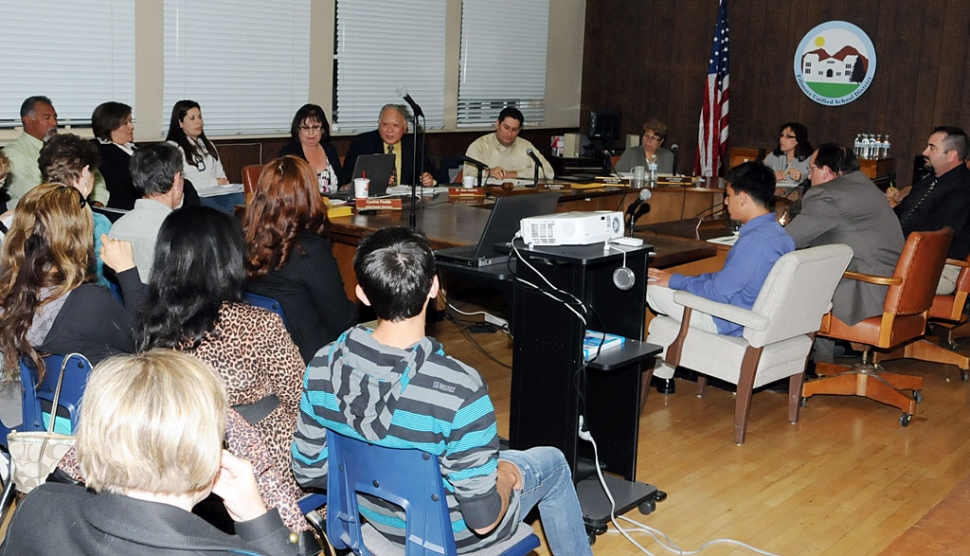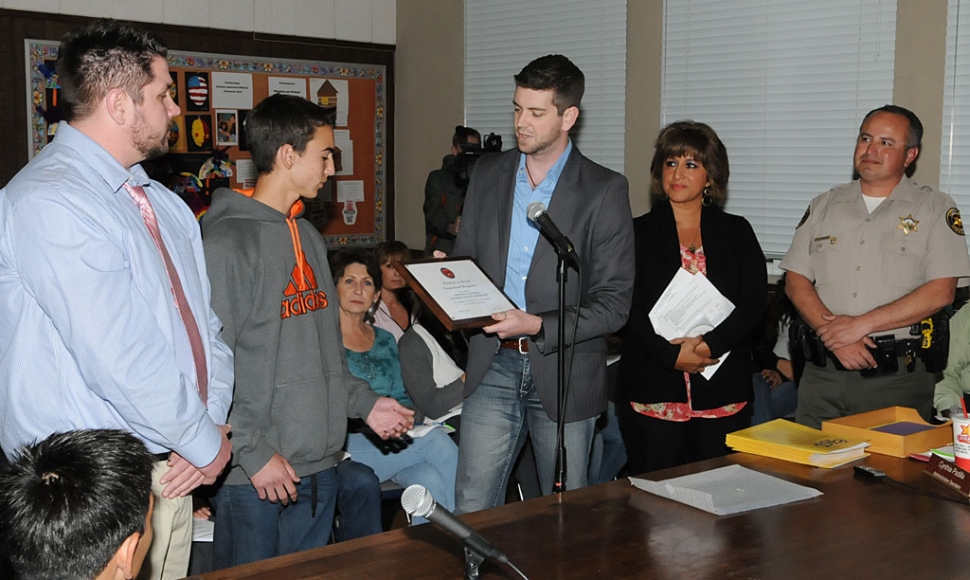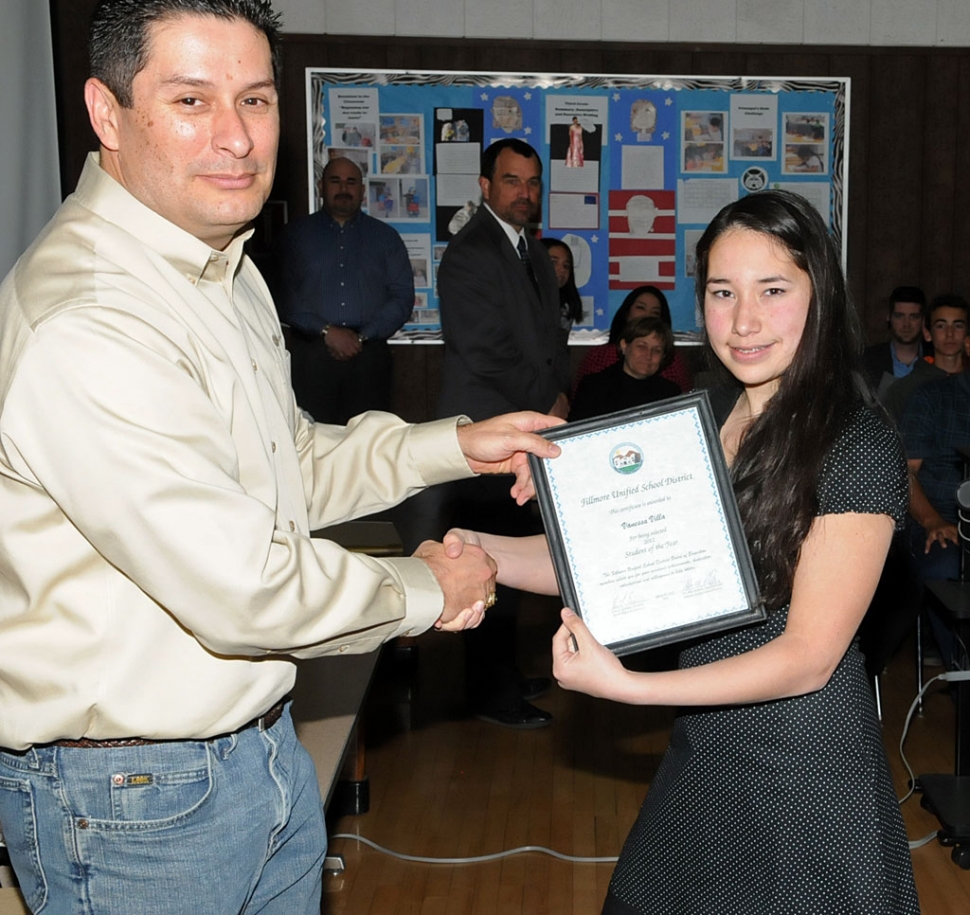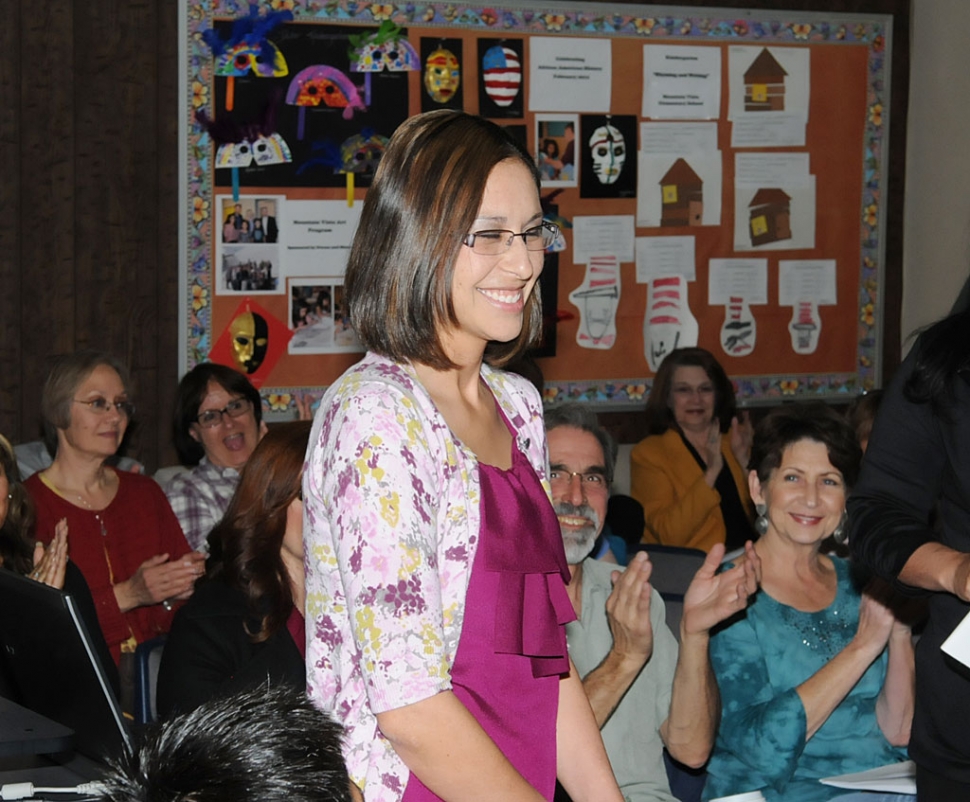|
CSEA Union, District disagree over state of finances
 By Anonymous — Wednesday, March 21st, 2012
 At Tuesday night’s school board meeting Joey Orozco (left) received a Certificate of Congressional Recognition from a representative of Congressman Elton Gallegly for his achievements at R.M. Pyles Boys Camp.  Vanessa Villa, Student of the Year .  Raina Arrellano, Teacher of the Year. The March 20, 2012 Fillmore Unified School District (FUSD) Board Meeting began with a threat of reprisal from the California School Employees Association (CSEA) and ended with an announcement of changes to Piru’s 6th grade class. Also discussed was Transitional Kindergarten, Classroom Climate Task Force, a presentation by UCSB Early Academic Outreach Program and awards for Student and Teacher of the Year. Tron Burdick, Labor Relations Representative with the CSEA addressed the Board regarding a contract disagreement. FUSD would not agree with certain retirement benefits asked for during contract negotiations and as a result CSEA is ready to fight for them, with Burdick adding, “The cost to negotiate will far exceed the cost of the benefits we wanted.” Burdick brought up another item CSEA was upset about; the use of volunteers to help in school offices. He told the Board that using volunteers was allegedly against their contract and that CSEA will be fighting to stop it. Burdick also alleges the District is not as financially strapped as they claim. Upon ending his scathing address Burdick was applauded by most of the faculty in attendance; many of whom may be in a fighting mood due to the 25 layoff notices sent out last week. Dr. Alan Nishino, FUSD Superintendent, answered the allegations made by Burdick regarding the budget stating, “We must budget for three years, which includes this year, next year and the following year” and added, “We must have a rainy day fund…we have to budget without being sure we’ll even get the money.” He went on to say FUSD budgets conservatively whereas some other school districts budget using the best case scenario. An item approved that may please parents with four and five year old children just starting school was Transitional Kindergarten (TK) which the Board voted to continue offering. Last Tuesday there was a 3-1 vote in Sacramento by the education finance subcommittee rejecting Governor Brown’s proposed State Budget calling for the elimination of the program in an effort to save $224 million. TK is a state law that was passed in 2010 and is part of a larger bill known as Kindergarten Readiness Act which advances the date children start kindergarten. By 2014 children must be five years of age by September 1 for kindergarten eligibility. The 2012-2013 school year requires kindergarten students to be five years of age by November 1, 2012. For the 2013-2014 school year, students must be five by October 1, 2013. In California and nationwide,... the starting age for kindergarten varies widely and often a four-and-a-half-year-old and a six-and-a-half-year-old can be found in the same kindergarten class. Today many parents and educators have come to believe that holding a child back improves their social/emotional, intellectual, or physical growth with the concept gaining support nationally for a number of years. The practice is called Redshirting, a name which came from the practice of postponing a college athlete's participation in regular season games for one year to give him an extra year of further growth and practice with the team in the hope of improving the player's skills for future seasons. The cost of the program will be paid by the State. Also announced was changing 6th grade students that attend Piru Elementary. Starting the next academic year they will be attending school at Fillmore Middle School. Awards went to Raina Arrellano for Teacher of the Year, Vanessa Villa for Student of the Year and Joey Orozco received a Certificate of Congressional Recognition from U.S. Representative Elton Gallegly for his achievements at R. M. Pyles Boys Camp. An expected change to education that probably will not happen is Gov. Brown’s Weighted Funding finance reform. Weighted Funding would have given schools a base grant amount, around $4,900 per student, then additional funds given to districts with high concentrations (60% or more) of disadvantaged students and larger funding for those with 90% or more. The Education Coalition, an alliance of organizations and union representatives, rejected Brown’s school finance reform proposal. The nine groups rejecting include; the Association of California School Administrators (ACSA); California Association of School Business Officials (CASBO); California County Superintendents Educational Services Association (CCSESA); California Federation of Teachers (CFT); California School Boards Association (CSBA); California School Employees Association (CSEA), representing non-certified school employees; California State PTA; California Teachers Association (CTA); and Service Employees International Union (SEIU), representing other non-certified school workers. It was not that these groups disagreed with the concept of Weighted Funding, but that they wanted a clearer understanding of how the money would be allocated to schools. Epi Torres gave a presentation on the newly formed Classroom Climate Task Force (CCTF). The purpose of the CCTF is to document the expectations of both students and teachers on their expectations are of each other while in school. This was achieved through a district wide survey given to both teachers and students. Expectations of teachers are; they will keep up to date records of students’ progress in class and make this information available; create a safe and orderly school environment; teach students’ standards-based content at grade level; follow best practices in teaching; and create a professional and respectful school climate. Student’s expectations include; have a positive attitude; expect success; accept responsibility; respect themselves and others; and think before acting. Also discussed was an internet site used by FUSD called Zangle which enables teachers, students and administrators to connect to the school’s student information and gives parents access the their child’s grades and progress. Nishino suggested doing training classes sometime in the future to teach parents unfamiliar with computers how to log onto the internet site. He suggested a letter could be sent out giving dates and times of the training sessions and informing parents the library has computers they can use if they don’t own one. Britt A. Ortiz and Olivia Palacio with UCSB, Early Academic Outreach Program (EAOP) gave a presentation on the services they offer to students preparing for college. EAOP’s goal is to raise student achievement levels and close the achievement gaps between groups of students along with insuring that first generation, socio-economically disadvantaged and English-language learners are prepared for postsecondary education. State funding for this was over a million dollars in the past, but this year it was cut by 50%. After Ortiz spoke, Nashino informed everyone that due to the budget cuts only eight California State University (CSU) campuses will admit students for the spring 2013 term with admission being limited to community college transfer applicants. Many of the CSU with students applying for fall admission in the 2012-13 academic year will be put on wait-lists until the outcome of the November election is known. The 23 CSU’s currently have 427,000 students and 44,000 faculty members and staff. This year CSU’s received nearly 55,000 more applicants than last year with first-time and transfer students submitting 665,860 applications. The eight campuses that will accept students for the spring 2013 sessions are: Chico, Channel Islands, East Bay, Fullerton, Los Angeles, San Francisco, San Bernardino, and Sonoma. In other news, Sammy Martinez, Fillmore High School’s (FHS) Speaker of the House, announced the fundraising accomplishments and future activities of FHS students. The student’s fundraiser, Pennies for Patients, raised over $1,000 which overreached their goal of $800. The junior prom’s theme is “Forever in Paris” and being held at the Saticoy Country Club on May 12th. California State Testing (CST) is May 1st-4th and seniors are selling Garden Market tickets $8.00. |
